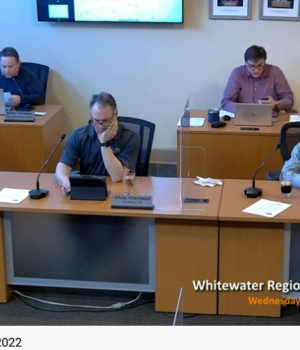Roads Department Lane Cleroux introduced Andrew McDonald and Jason Shultz of JP2G Consulting presented an update the the Wastewater Treatment Plant in Cobden.
Jason Shultz said that the plant, as of April 26th, has the construction complete and that they were ‘pleased; with the effluent discharge, which met the MOE requirements.
“Currently, the contractor continues to work on deficiency items, that could not be completed in the winter.” he said.
“If you’re onsite and you’re seeing it, the output looks like drinking water.”
He said the remaining holdbacks were held for maintenance and manual provision by the contractors, to ‘prevent undue pressure to the taxpayers’
He said they had suffered delays due to six days of weather, delays due to more rock blasting that was anticipated, and ‘COVID-19 delays’, but construction was finalized as of March 21st of 2022.
He said that the plant would meet community needs ‘through 2036’ based on their tests.
He said that the Township had options to decommission or keep the old plant, with decommissioning saving hydro costs and providing spare equipment, and keeping it providing
“We recommend operating the plant for six months to confirm new plant is handling loads,and then Township can make a decision as to decommissioning the old plant.”
Councillor Dave Mackay asked what kind of tonnage of waste would come from the plant per year for the landfill.
McDonald confirmed that they had estimated tonnage as per the design report submitted with the environmental study, but did not readily know it
Lane Cleroux said that they track the effluent with the landfill weight scale, and could provide a number.
“It is a minimal amount.” Steven Hodson said. “It’s like three or four of those tandem dumping trailers per week. It’s minimal, minimal quantity.”
Councillor Chris Olmstead asked if they were any reports on capacities of the new plant’s average operating capacities and if they were nearing anywhere near maximum capacity.
“In terms of flows handled, the old plant was rated to 696 cubic meters a day average flow. We experienced about 750 cubic metres a day. That kind of triggered the whole project. There were a list of bypasses occurring during wet weather events. “The new plant average day flow is 1000 cubic metres per day, and that’s to accommodate population growth out to 2036. That’s not a direct a comparison, with the old treatment standards are 15 milligrams per litre for CBOD, but the new treatment effluent standards are a lot more strict, so they bring them down to 5 milligrams per litre. We’re doing more and we’re treating it a lot better, so it’s a bit harder to compare it to the old plant’s conditions.”
“I’m not smart enough to follow all of that, so what efficiency are we operating at. Just give me a percentage of what efficiency we’re operating at?” Olmstead asked.
McDonald said that at the peak operation they were operating at “60%”, but he said he would like to get the updated flow numbers as that was based on numbers from early March.
Councillor Daryl McLaughlin asked who was responsible to create the operating manuals for the plant.
Shultz said that they were ‘in draft’ and would be sent to OCWA and be provided electronically to the Township and available in binder and tablet form.
Councillor McLaughlin also asked if the effluent would be used for garbage and if it would use any space.
Superintendent Hodson said that they ‘don’t get enough of it to cover any garbage.” and only would use ‘a minute amount’ of space.
Mayor Mike Moore asked if there would be proper security on the tablets to avoid data leaks.
McDonald said that the tablets would have their own firewall, while Shultz said that the Ipads the operators use ‘would likely not have internet access’.
Shultz also said that cyberattackers “could not shut down the plant in that manner.”
“The actual system is not connected to the internet, The only time it is is for updates or for remote access to the companies.” Cleroux said. “OCWA do not allow physical connection to the internet at all times for that reason.”
Councillor Mackay asked if the effluent had a smell, which Superintendent Hodson confirmed it had a ‘high odor’.
Councillor Niel Nicholson asked how JP2G would handle the six month operations, which CAO Trembley said the consultants would come back with a recommendation by staff at a later meeting.
Councillor Nicholson said that the Council had ‘an environmental responsibility’ to deal with the septage and that it must be part of future discussions on decommissioning the old plant.
The meeting was concluded.






![Kenopic/Smith Auction [Paid Ad]](https://whitewaternews.ca/wp-content/uploads/2018/10/advertising-100x75.jpeg)

